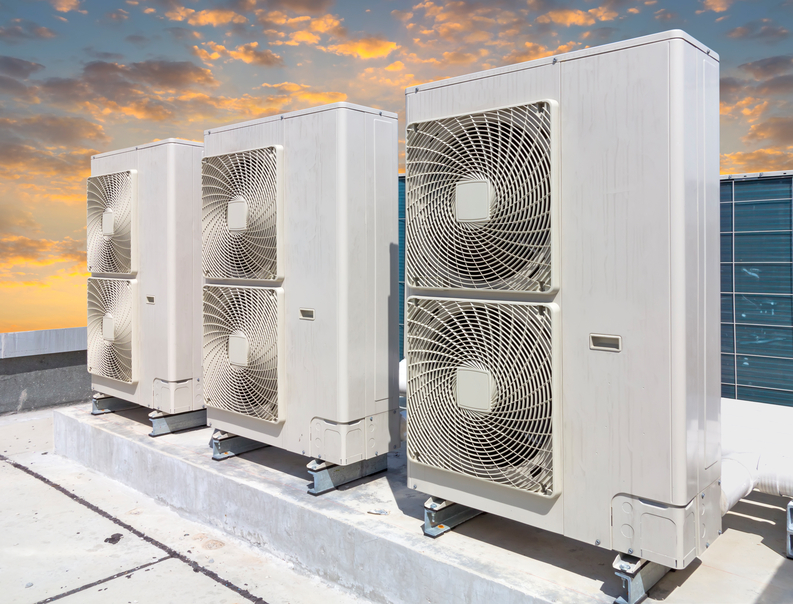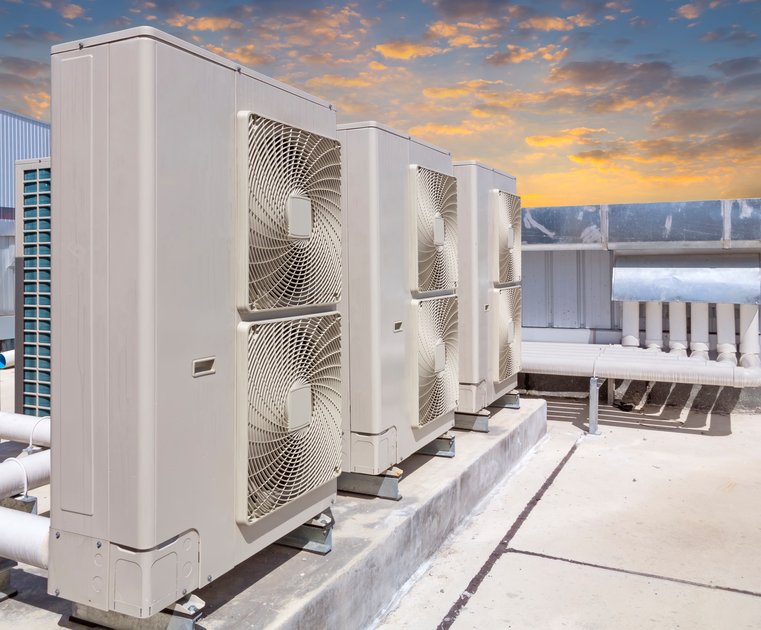HVAC Applications 24 PDH Discount Package
Desiccant Cooling Technology (M04-022)
Heating and Cooling System Upgrades (M03-022)
HVAC Cooling Systems for Data Centers (M05-020)
High Performance Data Centers Best Practices (M06-037)
All About Gas Fireplaces (M03-031)
HVAC System Validation Simulation (M01-008)

This online engineering PDH course presents an overview of commercial heat pump water heaters (HPWHs) applications. In today's industry, HPWH's are viewed as an effective and efficient method to provide hot water for commercial buildings. The system uses a water-heating heat pump to move heat from a cool reservoir, such as air, and transfer this heat into water. In addition this course illustrates the benefits and energy savings behind this technology, explains how to properly size an HPWH system and highlights the costs associated with the installation of HPWHs.
This 2 PDH online course is applicable to mechanical engineers, designers, contractors, building professionals, and all personnel interested in gaining a better understating of HPWH.
This PE continuing education course is intended to provide you with the following specific knowledge and skills:
- Understanding the principles of operation behind HPWH
- Knowing the benefits and energy savings of HPWH
- Familiarizing with the implementation barriers of HPWH
- Learning how to size an HPWH system
- Learning about the design and installation considerations associated with HPWH
- Understanding with the cost considerations associated with the installation of HPWH
In this professional engineering CEU course, you need to review "Commercial Heat Pump Water Heaters "of the Department of Energy (DOE) and Federal Technology Alert (FTA) publication.
Upon successful completion of the quiz, print your Certificate of Completion instantly. (Note: if you are paying by check or money order, you will be able to print it after we receive your payment.) For your convenience, we will also email it to you. Please note that you can log in to your account at any time to access and print your Certificate of Completion.

This online engineering PDH course provides an overview of how desiccant systems operate and how they can be of benefit. This course is based entirely on U.S. Army Construction Engineering Research Laboratory resource guide "Desiccant Cooling Technology" developed by U.S. Army Construction Engineering Research Laboratory. This course provides condensed information on desiccant technology, which will benefit reader to learn a significant amount in brief time frame.
Desiccants cooling technology provides a tool for controlling humidity (moisture) levels for conditioned air spaces. It offers numerous advantages over the more common vapor-compression and absorption units. For example, desiccant systems do not need ozone-depleting refrigerants and are very effective at treating the large humidity loads resulting from ventilation air. Also, they use natural gas, solar thermal energy, or waste heat, thus lowering peak electric demand.
The use of desiccant cooling and dehumidification systems into existing and new buildings has shown reduced energy costs, better health, greater comfort and increased productivity for building occupants. Recent advances in adsorptive materials, in conjunction with dehumidifier design innovations are making the technology increasingly attractive.
This 4 PDH online course is applicable to HVAC engineers, facility engineers, architects, environmentalists, operations and maintenance personnel, as well as consultants and contractors who construct, build and manage facilities.
This PE continuing education course is intended to provide you with the following specific knowledge and skills:
- Understanding the fundamental concepts of desiccant technology
- Understanding the benefits of dehumidification with desiccants
- Understanding the alternatives to desiccant dehumidification
- Understanding the types of desiccant systems
- Understanding the application of desiccant systems
- Understanding the performance issues related to desiccant systems
- Understanding the maintenance issues related to desiccant systems
- Understanding the method to calculate heat and moisture loads
- Understanding the sizing of desiccant equipment
- Understanding the selection of control system
- Understanding the cost evaluation (equipment costs, installation costs, operation costs and maintenance costs)
- Understanding the lifecycle cost analysis in design of desiccant technology
In this professional engineering CEU course, you need to review the course document titled "Desiccant Cooling Technology".
Upon successful completion of the quiz, print your Certificate of Completion instantly. (Note: if you are paying by check or money order, you will be able to print it after we receive your payment.) For your convenience, we will also email it to you. Please note that you can log in to your account at any time to access and print your Certificate of Completion.

This online engineering PDH course identifies the opportunities for improving the performance of the heating and cooling system based on the type of system that is in place.
Heating and cooling systems are the largest single consumers of energy in buildings. These systems condition the air within a building so that occupants are comfortable. Heating and cooling systems consist mainly of chillers, boilers, cooling towers, and pumps. There are central heating and cooling systems, and unitary systems that combine heating and cooling. Opportunities exist for improvement to both central and unitary systems.
This 3 PDH online course is applicable to engineers, contractors, designers and other technical professionals who are involved in the retrofit of existing heating and cooling systems.
This PE continuing education course is intended to provide you with the following specific knowledge and skills:
- Understanding the best opportunities available for upgrading central cooling systems including chillers, cooling towers, water side economizers and pumps
- Understanding the best opportunities available for upgrading central heating systems including boilers and furnaces
- Understanding the best opportunities available for unitary systems including packaged or rooftop units, split system packaged units, air source heat pumps and water loop heat pump systems
- Learning about new strategies aimed at saving energy such as geothermal heat pumps, district cooling and heating, radiant heating and cooling, cool storage, high temperature difference distribution, evaporative cooling, and non-electric cooling
In this professional engineering CEU course, you need to review "Heating and Cooling System Upgrades" of the Energy Star Building Manual. (Energy Star is a joint program of the U.S. Environmental Protection Agency and the U.S. Department of Energy).
Upon successful completion of the quiz, print your Certificate of Completion instantly. (Note: if you are paying by check or money order, you will be able to print it after we receive your payment.) For your convenience, we will also email it to you. Please note that you can log in to your account at any time to access and print your Certificate of Completion.

This online engineering PDH course presents a detailed discussion on the key concepts and practices relating to data cooling technology as well as air flow practices that improve conditions for IT equipment and reduce overall HVAC energy consumption.
The basic physics of a data center is that electricity is converted to heat. Equipment in the data center expends power, generating heat, requiring air conditioning and ventilation equipment to keep them cool and running well. If the temperature rises too high, equipment will begin to malfunction or become damaged; as the internal components begin to swell and pull away from each other (or simply burn-up). The cooling system is also required to adjust the humidity of the air and to remove particles. Depending upon the climate at a data center's location, moisture may need to be added or removed. Similarly, the types and amount of particles to be removed from the air are determined by the location and external events.
Data center cooling is a highly specialized area that uses precision cooling equipment that differs from the conventional comfort equipment. The combination of heat and the high sensitivity of electronic components in data center environments demands maximum availability and performance of the cooling equipment. Precision cooling systems have been designed specifically for this purpose.
This 5 PDH online course is applicable to mechanical engineers, electrical engineers, HVAC consultants and engineers, architects, O & M professionals, facility managers, estimators and general audience seeking to gain a better understanding of HVAC cooling systems for data centers. No specific prerequisite training or experience is required.
This PE continuing education course is intended to provide you with the following specific knowledge and skills:
-
Understanding the data center space planning and utilities requirements based on current and future needs
-
Describing the various cooling options and how to apply them effectively
-
Understanding the fundamentals of heat gain, temperature and humidity requirements, pressurization and filtration, as applicable, to data centers
-
Understanding the difference between comfort versus precision cooling
-
Learning about the raised floor and overhead air distribution schemes for data center cooling
-
Understanding how airflow is managed in the data center to prevent hot air/cool air mixing and the ways to improve this with containment
-
Understanding the environmental implications, design and system pitfalls as well as energy efficiency optimization
-
Identifying the key elements of data center cooling systems including CRAC, DX system, chilled water systems, evaporative condensers, etc.
-
Explaining the implications of equipment placement, installation and decommissioning on cooling and energy efficiency
-
Determining how cooling may be applied in various data center scenarios
-
Learning about HVAC best practices and how they apply to a specific site and how they improve energy efficiency
-
Learning about the benchmark energy efficiency figures for ideal data centers
In this professional engineering CEU course, you need to review the course document titled, "HVAC Cooling Systems for Data Centers".
Upon successful completion of the quiz, print your Certificate of Completion instantly. (Note: if you are paying by check or money order, you will be able to print it after we receive your payment.) For your convenience, we will also email it to you. Please note that you can log in to your account at any time to access and print your Certificate of Completion.

This online engineering PDH course presents the best practices for a high performance data center utilizing the following systems: air management, air-side economizer, centralized air handling, cooling plant optimization, direct liquid cooling, free cooling with water side economizer, humidification controls alternatives, power supplies, self-generation and uninterruptable power supply systems along with a case study/benchmark findings for each of the above systems.
Data centers can consume 25 to 50 times as much electricity as standard office spaces. With such large power consumption, they are prime targets for energy efficient design measures that can save money and reduce electricity use. But the critical nature of data center loads elevates many design criteria -- chiefly reliability and high power density capacity – far above efficiency. Short design cycles often leave little time to fully assess efficient design opportunities or consider first cost versus life cycle cost issues. This can lead to designs that are simply scaled up versions of standard office space approaches or that re-use strategies and specifications that worked “good enough” in the past without regard for energy performance. The Data Center Design Guidelines have been created to provide viable alternatives to inefficient building practices.
The 6 PDH online course is intended for mechanical, electrical and computer engineers, as well as architects and any other technical personnel interested in gaining a better understanding of energy savings in data centers.
This PE continuing education course is intended to provide you with the following specific knowledge and skills:
- Learning how to select high performance mechanical and electrical data center equipment and understand their various energy efficient configurations/ applications
- Understanding how to efficiently layout data center equipment through air management best practices
- Learning how to benefit from free cooling (air-side and water-side) economizers in data centers
- Familiarizing with the different cooling plant optimization best practices in data centers
- Learning how direct liquid cooling is applied to data centers
- Familiarizing with the humidification control alternatives in data centers
- Understanding how UPS systems can be efficiently utilized in data centers
- Reviewing several case studies illustrating the above systems
Once you complete your course review, you need to take a multiple-choice quiz consisting of thirty (30) questions to earn 6 PDH credits. The quiz will be based on the entire PG&E publication.
Upon successful completion of the quiz, print your Certificate of Completion instantly. (Note: if you are paying by check or money order, you will be able to print it after we receive your payment.) For your convenience, we will also email it to you. Please note that you can log in to your account at any time to access and print your Certificate of Completion.

This online engineering PDH course presents the basics of gas fireplaces and briefly describes their different types, venting systems, efficiency ratings, ignition and controls, as well as their heat exchange and transfer. It also describes what to look for in a safe, energy-efficient gas fireplace as well as the problems that can be encountered with certain technologies. This course also provides information about where to locate the fireplace for maximum benefit and efficiency.
Changes in the way houses are built and renovated have made most contemporary homes incompatible with conventional wood-burning fireplaces. Most notably, the increased insulation and improved air-tightness of today's homes run counter to the large amounts of air required by conventional wood fireplaces. Such fireplaces are also extremely inefficient and produce high levels of harmful emissions, which pollute outdoor air and can have dangerous effects on indoor air quality. Some new fireplace designs offer a safe, energy-efficient and environmentally friendly alternative to conventional wood fireplaces.
This 3 PDH online course is applicable to engineers, architects, designers, contractors, homeowners, and gas fireplace manufacturers.
This PE continuing education course is intended to provide you with the following specific knowledge and skills:
-
Understanding the different types of gas fireplaces and their venting systems
-
Familiarizing with common efficiency ratings
-
Familiarizing with different types of ignitions and controls
-
Understanding the basics of heat exchange and transfer
-
Knowing where to locate a fireplace for maximum benefit
-
Understanding the safety tips for operating a gas fireplace
-
Learning how to use the gas fireplace efficiently
In this professional engineering CEU course, you need to review the publication "All About Gas Fireplaces" by the Office of Energy Efficiency of the Natural Resources Canada, revised March 2004.
Upon successful completion of the quiz, print your Certificate of Completion instantly. (Note: if you are paying by check or money order, you will be able to print it after we receive your payment.) For your convenience, we will also email it to you. Please note that you can log in to your account at any time to access and print your Certificate of Completion.

This online engineering PDH course describes the HVAC simulation-based validation methodology, performance validation of HVAC systems, energy analysis of HVAC systems and other related factors involved with system simulations.
Significant potential exists with the current technology of energy management and control systems (EMCS) for monitoring and optimizing building systems during operation. More effort is spent typically on the design of a system and its construction/installation than on its operation. Operational optimization of building systems has traditionally attracted much less attention, and investments made in ensuring that the systems installed in a building are operating correctly are often relatively small.
This 1 PDH online course is applicable to mechanical engineers who conduct energy evaluation simulation studies on facilities to evaluate performance of the energy management and control system and performance validation of HVAC systems.
This PE continuing education course is intended to provide you with the following specific knowledge and skills:
- Simulation-based validation methodology
- Component and subsystem models
- Performance validation of HVAC systems
- Energy analysis of HVAC systems
In this professional engineering CEU course, you need to review the material contained in the course document titled "Performance Validation and Energy Analysis of HVAC Systems Using Simulation".
Upon successful completion of the quiz, print your Certificate of Completion instantly. (Note: if you are paying by check or money order, you will be able to print it after we receive your payment.) For your convenience, we will also email it to you. Please note that you can log in to your account at any time to access and print your Certificate of Completion.